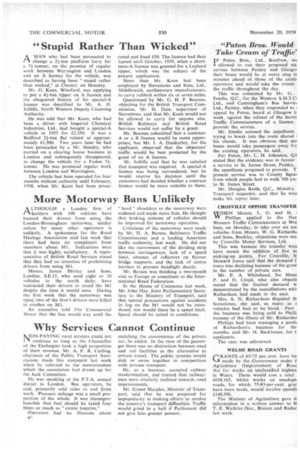"Stupid Rather Than Wicked"
Page 42

If you've noticed an error in this article please click here to report it so we can fix it.
AMAN who had been persuaded to change a 24-ton platform lorry for 74-tonner, on the promise of regular work between Warrington arid London and an A licence for the vehicle, was described as having been "stupid rather than wicked," at Chester, on Monday.
Mr. G. Keen, Winsford, was applying to put a .44-ton tipper on A licence and the chequered history of his special-A licence was described to Mr. A. H. Jolliffe, North Western Deputy Licensing Authority. .
He Was told that Mr. Keen, who had been a drier with Imperial Chemical Industries, Ltd., had _bought a special-A vehicle in 1955 for £2,350. It was a Bedford 24-ton flat valued at approximately £1,300. Two years later he had been persuaded by a Mr. Hendry, who carried on a clearing house business in London and subsequently disappeared, to change the vehicle for a Poden 7tonner. He was promised regular work between London and Warrington.
The vehicle had been operated for four months without authority until February, 1958, when Mr. Keen had been prose
cuted and fined £50. The licence had then lapsed until October, 1959, when a shortterm-A licence was granted for a Leyland tipper, which was the subject of the present application.
• 'Since then Mr. Keen had been :employed by Steventons and Sons, Ltd., Middlewich, earthenware manufacturers, to carry rubbish within six or seven miles.
Questioned by Mr. G. H. P. Beames, objecting for the British Transport Commission, Mr. H. Dale, supervisor of -Steventons, said that Mr. Keen Would not be allowed to carry for anyone else. 'British Railways and British Road Services would not suffer by a grant.
Mr. Beames submitted-that a contractA or a ft licence would be more appro
• priate, but Mr. J. A. Dunkerley, for the applicant, observed that the 'objectors' traffic would be best protected by the grant of an A licence.
Mr. Jolliffe said that he was satisfied that transport was required. A special-A licence was being surrendered. but he would reserve his decision until the customers had decided Whether a contract licence would be mote suitable to them.




































































































